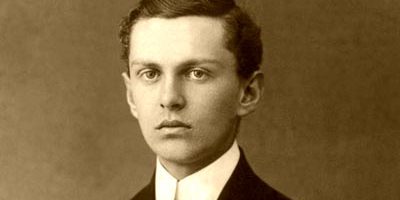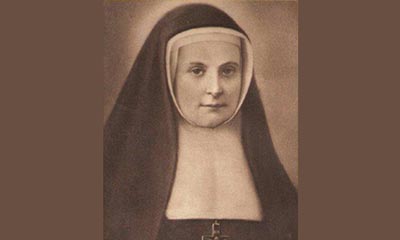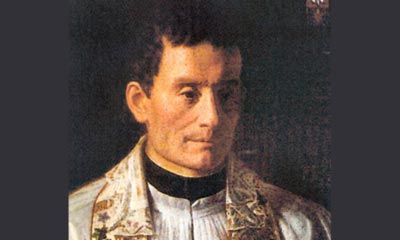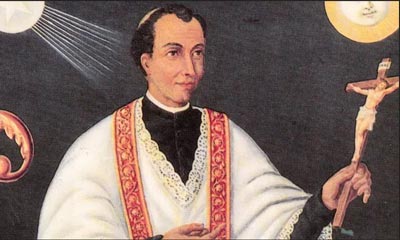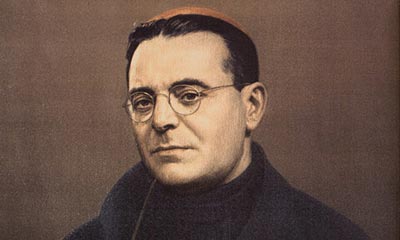December 24, 2021
Blessed Ivan Merz
Dear Friends,
“Dear brothers and sisters, may the just man, surrounded by divine light, become in turn a lamp which radiates light and gives warmth!” said Pope Saint John Paul II on June 22, 2003. “Such is the lesson that the figure of the recently beatified Ivan Merz teaches us for our time. He was a gifted young man who made the most of his brilliant natural talents and achieved a high level of human accomplishments: his life could be described as one of personal success. But this is not the reason why he is today included in the golden book of the blessed. The reason why he was added to their ranks is his success before God. The great aspiration of his whole life was indeed ‘never to forget God, always to desire to be united with Him.’ In each and every one of his activities he sought the sublime aspect of knowing the Christ Jesus, and he allowed himself to be apprehended by Him (cf. Phil 3:8-12).”
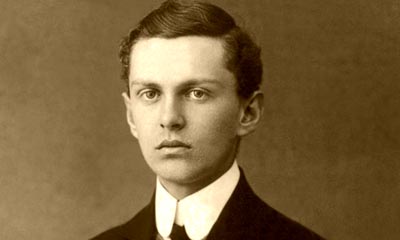 Ivan Merz was born on December 16, 1896 in Banja Luka, a city in Bosnia that was under the control of Austria-Hungary at the time. As an only child, Ivan’s tender years were filled with great love, and he received a proper middle-class education. He obtained his baccalaureate in 1914. His teacher, Dr. Ljubomir Marakovic, a model Catholic layman, guided him towards moral and religious values through literature and art. Ivan later wrote of him: “A Catholic layman saved me for eternity!” Ivan read assiduously, learnt French and English (he would come to master a dozen languages), and studied the piano and the violin; he was also a gifted draughtsman. A true sportsman, he played tennis, cycled, practiced gymnastics and skating on ice; he also enjoyed playing chess.
Ivan Merz was born on December 16, 1896 in Banja Luka, a city in Bosnia that was under the control of Austria-Hungary at the time. As an only child, Ivan’s tender years were filled with great love, and he received a proper middle-class education. He obtained his baccalaureate in 1914. His teacher, Dr. Ljubomir Marakovic, a model Catholic layman, guided him towards moral and religious values through literature and art. Ivan later wrote of him: “A Catholic layman saved me for eternity!” Ivan read assiduously, learnt French and English (he would come to master a dozen languages), and studied the piano and the violin; he was also a gifted draughtsman. A true sportsman, he played tennis, cycled, practiced gymnastics and skating on ice; he also enjoyed playing chess.
At the age of seventeen, Ivan started a diary in which he described the states of his soul. The journal opened with this exclamation: “Long live art!” On March 2, 1914, he noted, “In physics, we discussed the speed of light… My God, how great is the universe: everything shines, everything moves with perfect precision, everything is great, immensely great… But this great universe, that which is visible or invisible, audible or inaudible, who is its master…? It is He!” On April 26, he continued: “The more I learn about Catholicism, the more I realize how inexhaustible it is.” But his spiritual life passed through shadows: “I am terribly beset by temptations,” he wrote on August 30, “but prayer lifts me up.”
After graduating from high school, Ivan joined the military academy in Vienna, because his parents wanted him to be an officer like his father. He, however, had no taste for a military career, and he only remained at the academy for three months. It was there that he discovered the moral misery of many. “When I hear foul language,” he noted on December 19, “when ugly images also want to penetrate my soul, I always, invariably, look at the image of the Madonna with the Child, the beautiful and majestic expression that is the epicenter of all that is sublime.”
“Aut catholicus aut nihil!”
At the beginning of 1915, Ivan started his studies in Vienna. To please his mother, he enrolled in law school, but at the same time he took literature classes. He continued to read widely, went to the theater, to concerts, to operas. Temptations overwhelmed him, but still he intensely sought after the ultimate truth. On May 17, he wrote: “My life is a big question mark. With each passing day I am losing my childlike faith. I miss the discernment between good and evil that I had in the past… God exists; even in the most dire moments of temptation and doubt, I firmly believe that He is the only one, the eternal, the great God. Since He exists, it must follow that our life has a purpose… However, it is not enough to believe. Our faith must be a system, an indicator in life, so that we do not act against the principles of justice and eternity… And I say: “Aut catholicus aut nihil” (either Catholic or nothing). From this point of view, there has never been a shadow of doubt within me. I know and feel that Catholicism is the only authentic religion.”
While waiting to join the army, having been called up (Europe was at war at the time), Ivan lived with his parents. He perceived the answers to many questions by the light of his faith. On the feast of the Immaculate Conception, December 8, he vowed to remain chaste until marriage. And on January 23, 1916, he wrote: “I long to be humble! Extremely humble! I long to destroy all this natural pride, and humbly aspire to the truth, simply because of truth itself…” On the 28th he continued: “I am conscious that I am very far from any kind of perfection… Then I reflect upon my actions and I realize that I am a Christian in word but not in deed. Christianity has not penetrated my blood… I should pray to God more lengthily so as not to lose this mystical link with Him.” Yet he noted on February 24: “I love peace and silence very much; I can reflect, I can think about the mystery of the Eucharist, I can withdraw into motionless awe, I can pray at length… It is so much better in solitude. Nothing compares with retreating to a small dark church and slowly praying the rosary to the flickering of the tabernacle light, to the last rays of the sun, and marveling, marveling, marveling eternally at the Eucharist, that brilliance, that grandeur, that infinite Love…”
The greatest work of art
In February 1916, Ivan left for the army and, after taking officer’s training, was sent to the Italian front. Faced with the suffering and death that surrounded him every day, he realized that the Christian religion was the only value that could overcome evil. On April 9, 1918, he noted: “We are on this earth but temporarily… a moment and we are no more; this life has no meaning except in preparing for the other… To be a practicing Catholic must be my goal.” At the end of the war, Ivan resumed his studies in Vienna. As an active member of a Croatian Catholic student group, he said at a meeting, “The basis of our life must be our rebirth in Jesus Christ: here below, the rest follows.” After engaging in spiritual exercises, he began to take an interest in the liturgy. “From Ash Wednesday until today,” he wrote on April 5, 1920, “I was in St. Gabriel’s near Mödling. It was my most beautiful Easter… The liturgy is the greatest work of art that exists in the world, and moreover it is the central art, because it artistically shows the life of Christ, who is the center of history…”
Meanwhile, his parents had moved to Zagreb. Ivan obtained a French scholarship thanks to a Jesuit Father and, in the fall of 1920, he went to Paris. For two years, he continued his literary studies at the Sorbonne and at the Catholic Institute. He became interested in French Catholic life, enrolled in the Confraternities of Saint Vincent de Paul and regularly attended the Benedictine chapel of the Rue Monsieur. On November 4, 1921, he wrote: “I was present at a novice’s taking of the habit of the Benedictine nuns. The liturgy is magnificent… The Sister dies to the world, she becomes a string of horsehair (violin) that will eternally chant the glory of God… It is good to forget the whole world and to concentrate all one’s strength for Jesus.”
During his years of study in Paris, Ivan went on pilgrimage to Lourdes. From that time, the Blessed Virgin Mary took a central place in his life. In Mary, he discovered the perfect ideal of womanhood. “Yes, it is in Lourdes,” he wrote to his friend, the engineer Marosevic, “that I learned what the rosary is, and from then on it became my second best friend (the first one being the Eucharist).” To a young girl, he would later write: “Whenever this life seems rough and misfortunes fall upon you, take the rosary of the Virgin; it will console you and give you the strength to bear everything with equanimity, in total surrender to the will of God.” After his return to Zagreb, Ivan became an ardent apostle of piety towards Our Lady of Lourdes, through his articles and lectures accompanied by slides.
Around the Lord
A steady exchange of letters took place between Ivan and his mother, who did not approve of the intensity of his religious life; this led the young man to draw her attention to the brevity of life, which is but a preparation for eternity. In one of his letters, he wrote: “You well know that the university in Vienna, and then the war, my studies, and finally Lourdes have totally persuaded me of the truth of the Catholic faith, and that for these reasons my whole life revolves around the Lord Jesus Christ.” Ivan returned to Zagreb in the summer of 1922. That autumn, he obtained a position as a teacher of French and German at the high school of the Archbishopric. The following year, he successfully defended a thesis in philosophy at the University of Zagreb, analyzing the influence of liturgy on French writers. Ivan dedicated himself to an intellectual deepening of the truths of the faith. He was the first layman (in Croatia) to study Catholic philosophy and theology systematically, as well as the encyclicals and important declarations of the Popes. He built up a personal library of about 1,200 books.
Ivan wrote numerous articles on liturgy, gave courses on the subject, and trained young people to understand the priest’s action at the altar and to unite themselves to his prayer. “The liturgy,” he wrote, “is the official prayer of the Church, the official prayer of the betrothed of Christ, a dialogue between the betrothed and the divine Betrothed… It is on the foundation of the liturgy that every soul is educated. We can say that the liturgy is a pedagogy in the true sense of the word, because, thanks to it, a believer can live all the phases of the eternal life of Christ” (in the review Le renouveau de l’âme selon la liturgie).
“It is vital to understand that the liturgy is first and foremost the worship of the divine majesty… The true Christian spirit which the faithful draw from the liturgy ensures the edification of the Church in many ways. Through the acquisition of this Christian spirit by its members, the Church becomes more and more a community of worship and prayer, conscious of the need to pray always and never become weary (Lk 18:1). This characteristic of constant prayer, appropriate to the Body of Christ, is manifested in the official prayer of the liturgy” (December 3, 1983). In the liturgy, the Church “exercises the public worship which is due to God. This worship constitutes the summit toward which activity of the Church is directed, and it is likewise the font from which all her power flows” (Compendium of the Catechism of the Catholic Church, nos. 218-219). “It is from the liturgy, and especially from the Eucharist, as from a source, that grace flows in us and that we obtain with maximum effectiveness that sanctification of men in Christ and that glorification of God which all the other works of the Church seek as their end” (Vatican II, Constitution Sacrosanctum concilium, no. 10).
A day gained or a day lost
Ivan unquestioningly embraced the Church’s belief in the real presence of Christ in the Eucharist. “Communion is the source of life!” he noted in his diary. The heart of his prayer was daily Mass and Holy Communion. He spent three quarters of an hour in prayer every day. “The spiritual life,” he explained, “is a meditation on divine things, a participation in the inner life of God… Without the spiritual life, I would cease to exist.” Every year, he made a retreat; a leaf of paper was found in his missal with a few resolutions: “As a penance, accomplish professional duties with greater perfection… At every meal, exercise a penance for the salvation of souls… Never criticize the food… Continually perform acts of love for the good God, for the Savior.” He dedicated one tenth of his salary to the poor. In Zagreb, a disabled bootblack offered his services to passers-by right in front of Ivan’s house. The young man befriended him and often invited him to his apartment for dinner. “A day you devote to your neighbor is not a loss at all, but a gain,” he remarked. “On the other hand, the days you do nothing for others are days lost!” He was always ready to grant forgiveness to those who had offended him. “Whosoever wants to be a true worker for the divine cause,” he pointed out, “must not put himself forward; self-worship is the greatest obstacle to the success of our actions.” The Catholic Church was to his eyes “the greatest thing in the world.” His friend Dushan Zanko later remembered: “He carried the Church in his being so deeply and so spiritually that he felt himself to be a living part of it, in the same way that an arm or a leg is part of an organism that is called man.” Ivan himself inspired many priestly vocations.
At the beginning of the 20th century, the bishop of Krk, Croatia, initiated a large Catholic Youth Movement to oppose the rise of liberalism, which was working to eliminate the influence of the Church from public life. As a young teacher, Ivan became involved in this movement and in the Croatian Federation “Orlovi” (The Eagles). He became a beacon for the Catholic youth and insisted on the need for the laity to engage in apostolic work, in collaboration with the hierarchy of the Church and under its vigilant guidance. In the autumn of 1922, he was elected president of the “Croatian Union of Catholic Youth,” which merged a year later with “The Eagles” movement, becoming the “Croatian Union of Eagles.”
An ominous doctrine
“The lay faithful have as their own vocation to seek the Kingdom of God by illuminating and ordering temporal affairs according to the plan of God” (Compendium of the Catechism of the Catholic Church, no. 188). It is the special task of the laity “to order and to throw light upon these affairs in such a way that they may come into being and then continually increase according to Christ to the praise of the Creator and the Redeemer” (Vatican II, Lumen Gentium, no. 31). “In every temporal matter, lay people must allow themselves to be guided by the Christian conscience, since no human activity, even in temporal matters, can be exempt from the authority of God… that ominous doctrine which attempts to build a society with no regard whatever for religion, and which attacks and destroys the religious liberty of its citizens, is rightly to be rejected” (ibid., no. 36). To help the laity in their mission to society, the Church has developed a social doctrine (cf. CCC, nos. 2419-2425). This can only be put into practice if they become familiar with it through the study of pontifical teachings.
The Croatian Union of Eagles organized large gymnastic displays, rallies and other events. Thanks to Ivan, the association took on a strong religious and cultural dimension, which reflected itself in its motto: Sacrifice-Eucharist-Apostolate. He himself wrote an article summarizing the Eagles’ program: “The new generation of Catholics is riding the waves of the river that has flowed from the eternal Rome since 1905, a sweet memory of Pope Pius X, who published a Brief on frequent and even daily Holy Communion. These young people have a passionate love for our Savior who is always with them in the Most Holy Eucharist; they draw from it the strength for their action, their apostolate… May the good Lord allow the Golden Book (the charter of the association) to educate an army of apostles, an army of saints who will spread out in all directions throughout the Croatian homeland! May this work somehow contribute to the reign, everywhere in Croatia, of the principles of the Holy Roman Catholic Church, so that as far as possible, the Sacred Heart may take up our brothers in its divine embrace!”
Young people not only saw Ivan Merz as their apostle and leader, but as a true friend of all, always ready to do anything to help them find their way along the right path. Was advice needed or material help, or a job to be found? Must he give private lessons, or even give up his own bed, while being content to sleep on the floor? His door and his heart were always wide open.
Ivan attached great importance to moral issues. He strove to teach young people the true meaning of love, marriage, chastity and sexuality, even creating a brochure called “You and She.” He was also interested in the cinema, the press, social and economic problems, and the involvement of Catholics in politics. In one publication, he discussed the condition and role of women in society. His influence on the feminine youth, which was organized in a parallel association to the Croatian Union of Eagles, was great; many women and young girls discovered in him a man of God, a teacher, and a friend. Marica Stankovic, president of the women’s organization, wrote a series of articles about him, subtitled “Women’s Knight of Honor.” Ivan’s first aim was to instill in young women a sense of feminine dignity, an awareness of their place in society and in the Church, and their role in the apostolate.
Having hesitated for a time over his vocation, Ivan felt himself drawn to remain a layman to work for the eternal salvation of souls in Catholic associations. In 1923, on the feast of the Immaculate Conception, he took a perpetual vow of chastity and conceived a plan to establish an institute of lay people consecrated to God. He did not live to see the realization of his project. But his friend Marica Stankovic was to be the founder of the first lay women’s institute in the Croatian Church, under the name of “Community of Collaborators of Christ the King.” This secular institute brought together women who, like Ivan, had the desire to consecrate their lives entirely to God, in order to participate in the propagation of Christ’s kingdom, while at the same time exercising various professions.
More through suffering than through work
Since his youth, Ivan had suffered from an eye disease involving an inflammation of the frontal cavity, together with persistent toothache. These complaints were a hindrance to his enthusiasm for study and work. After advising a young teacher who was ill to take care of herself, he added: “If the Lord wishes you to suffer without being cured, it is good to put yourself in His hands… You yourself know better than I that through suffering we can do more for the propagation of the Kingdom of Jesus than through hard work, scientific discussions, brilliant speeches and articles.” The inflammation of his frontal cavity obliged Ivan to undergo a surgical operation. He clearly perceived that he was going to die and that God was asking him to sacrifice his life for the youth he was working with. On the eve of his departure for the clinic, in April 1928, he packed up his belongings and wrote his will in the form of an epitaph in Latin: “I died in peace in the Catholic faith.—For me, life was Christ, and death, a gain.—I anticipate the mercy of the Lord and the indivisible, complete, eternal possession of the Most Holy Heart of Jesus…”
The operation took place on April 26, but it was not successful. Ivan developed meningitis. On Sunday, May 6, Fr. Vbranek, his confessor, administered Extreme Unction; Ivan could no longer speak. The Father said to him: “Are you not offering your life as a sacrifice?” Ivan looked at him serenely, and his eyes shone; he nodded his head in agreement. On the 9th, he received a telegram from Pope Pius XI sending him his blessing. He was still fully conscious. The next day, Thursday, May 10, 1928, in the presence of his father and his closest friends, Ivan gave up his soul to God.
May Blessed Ivan Merz, through his intercession before God, help us to work for the extension of the Kingdom of God, whatever our state or form of life!


